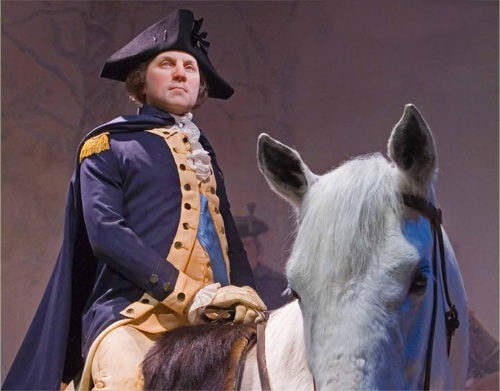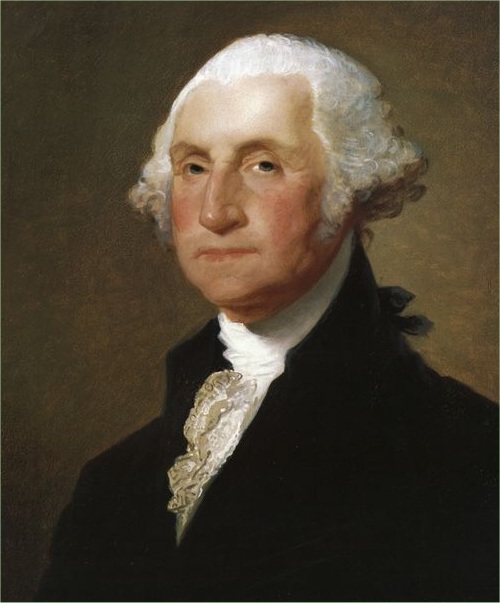Publisher's note: This discussion on free markets with Author McNeilly, George Washington historian, informs us of some of what made George Washington the great man that he eventually became in this informative Friday Interview here today on the Carolina Journal Radio.
Author McNeilly explores key precedents set by the first commander in chief
RALEIGH You might know him as the first American president, the father of our country, the top Revolutionary War general, or just the guy on the quarter and the dollar bill. But it's worth your time to learn more about George Washington as one of history's great leaders. That's the argument Mark McNeilly puts forward in the book George Washington and the Art of Business: The Leadership Principles of America's First Commander-in-Chief. McNeilly is a longtime marketing executive and an adjunct professor of marketing at the University of North Carolina at Chapel Hill. He discussed Washington's leadership skills with Mitch Kokai for Carolina Journal Radio. (
Click here to find a station near you or to learn about the weekly CJ Radio podcast.)
Kokai: People probably do have at least a very basic knowledge of George Washington, but you think we should know more about him. Why?
McNeilly: Part of it was
General George Washington, commander of the he Continental Army: Above.
from my own experience. When I was looking to write this book, I was looking around for different topics, different subjects, and I have read a lot of history, but I was surprised by how little I knew about what Washington had accomplished. I knew, of course, he was the first president, one of the Founding Fathers. He led us in the Revolutionary War. But as I learned more about him and some of the great things he had done, such as actually initiating the Constitutional Convention, facilitating the Constitutional Convention, and how he had persevered over all those years during the Revolution, taking what was essentially an armed mob and turning it into an army that could defeat one of the leading powers of Europe, I was just very impressed by how much he had accomplished. And I really thought, "Well, if I, who read a lot of history, know so little about him, I'm sure many others would do well to learn a lot more about him."
Kokai: Now you could tackle George Washington's biography in many different ways. You focus on leadership. What about his background made you say this is a person to profile in terms of leadership?
McNeilly: A couple things really struck me. One was his character and integrity, especially today. And throughout time, character and integrity in leaders has been an issue. And the thing with Washington is, he set such a standard for character and integrity in terms of when he was offered the position of commander in chief, he refused to take pay. He only wanted payment for his expenses. He deferred to Congress and listened to them and made sure that they felt comfortable with the actions that he was taking. And he retired after two terms. He could have stayed on for many other terms, but he felt that it was time to show that America could do a successful transition from one president to another.
Kokai: And I think, as a student of Washington myself, one of the more interesting things I remember is, before he became president, he was probably the most powerful person in the country as the head of the army. But at the end of the war, [he] didn't turn that into a dictatorship or a monarchy. He stepped down and became the [American version of Roman statesman] Cincinnatus.
McNeilly: Right. Exactly. And that I think is very impressive, and that was one thing Congress was very worried about -- was giving all this power to a general and then becoming a general that was very popular as he continued to win victories in the war. So when he actually turned over his sword to Congress, obviously Congress was relieved, but I think it really set the standard for other presidents, that they would follow, to defer to Congress and to realize that we're setting up a republic and not a monarchy.
Kokai: We want people to read the book, so we're not going to give away all the secrets. But in looking at the leadership lessons, what would be a key lesson people should learn from Washington's history?
McNeilly: There's a lot of lessons, but I think the one thing that really struck me the most was his perseverance -- the fact that he did stick with it. There were many personal letters that came out later where he was very, very discouraged. But at times when his army was about to disintegrate, he seized opportunities such as at Trenton and Princeton to refresh the army, to get the cause going again, the revolutionary cause going again. He persevered through smallpox epidemics, through a number of defeats, and through some different cabals that would actually try to get him out of office as the commander in chief. He persevered through all of that, and when he achieved victory, as you mentioned, he turned his sword back over to Congress and went home and had wanted to retire.
Kokai: Let's touch on some other key incidents in Washington's biography. We know of Abraham Lincoln as the president with the team of rivals, but Washington had America's first real high-powered team of rivals. You had Jefferson and Adams and all of the real high-powered founders in that initial government. Washington sort of kept them all in check.
McNeilly: Right. Well, he was very pragmatic. He wanted to listen to many different sides of the problem and try and take the right path. And he warned us against political parties, and as you know, Jefferson and Adams created the first political parties, so he was very worried about that. But he was very pragmatic, tried to listen to all sides of the problem, come up with a workable solution that would be good for the United States and move forward. And he had to balance those two against one another to try and move America forward.
Kokai: One of the
President George Washington, America's first president: Above.
other things that's very interesting about Washington as being the first president is he really set the standard and the example. You've already mentioned the two terms and then done, which everyone except [Franklin Roosevelt] then followed. How about some of the other things that he initiated as president that have helped us as the country has moved forward?
McNeilly: I think one of the things he set as a standard was the culture of the executive office and the fact that it would be well-regarded but wouldn't be ostentatious. People wanted to address him as "His Most Benign Highness," and he said, "No, just call me the president." He wanted to have nice but simple surroundings, and that really helped, I think, again, set the precedent for the White House today. It's very grand, but it's still simple in its taste, and it's a good symbol for a republic.
Kokai: It's hard to say in hindsight, but do you think if we hadn't had as good a first president as George Washington, our country would have been in much deeper peril than it was in the early years?
McNeilly: I think so. I mean, he looked and said that there's really a few things that we needed to do. We needed to fix the financial mess that we were in because we did have a huge deficit and a huge debt. We needed to deal with the powers of Europe. We needed to expand in the Northwest Territories. We needed to maintain the union. So he kept very focused on those things and was able to either arrange treaties or have the military power to achieve all the aims of the United States and get it set on the right path. And that was more the short term. I think the long term [set] some of the precedents we talked about and how he set the standard for his successors over time.
Kokai: When you look back at his entire career, which of the things that he did -- leading the army in almost impossible odds, becoming the first president, helping with the Constitutional Convention -- which of these things was most impressive to you?
McNeilly: That's tough. Well, they're all impressive. The most surprising to me was his role in the Constitution -- the fact that he was the president of the convention. That despite his stature, he chose not to dominate it, not to insert his own ideas but to facilitate the ideas of everyone such that they would feel that they had a hand in the crafting of it, and then they would go out and sell it to their states, who were critical for the ratification of the Constitution.
Kokai: For the people who are running for president now, what is one thing they should take from Washington and apply to themselves?
McNeilly: I would like if they'd not take the pay and only ask for expenses! I don't think that's going to happen. I think it's the fact that the Constitution -- it's deferment to the Constitution. He deferred to Congress before the Constitution was formed. After the Constitution was formed, he was very careful to make sure the decisions he made were in accordance with what he thought the Constitution said. So I would say that is the key lesson to take away.
























